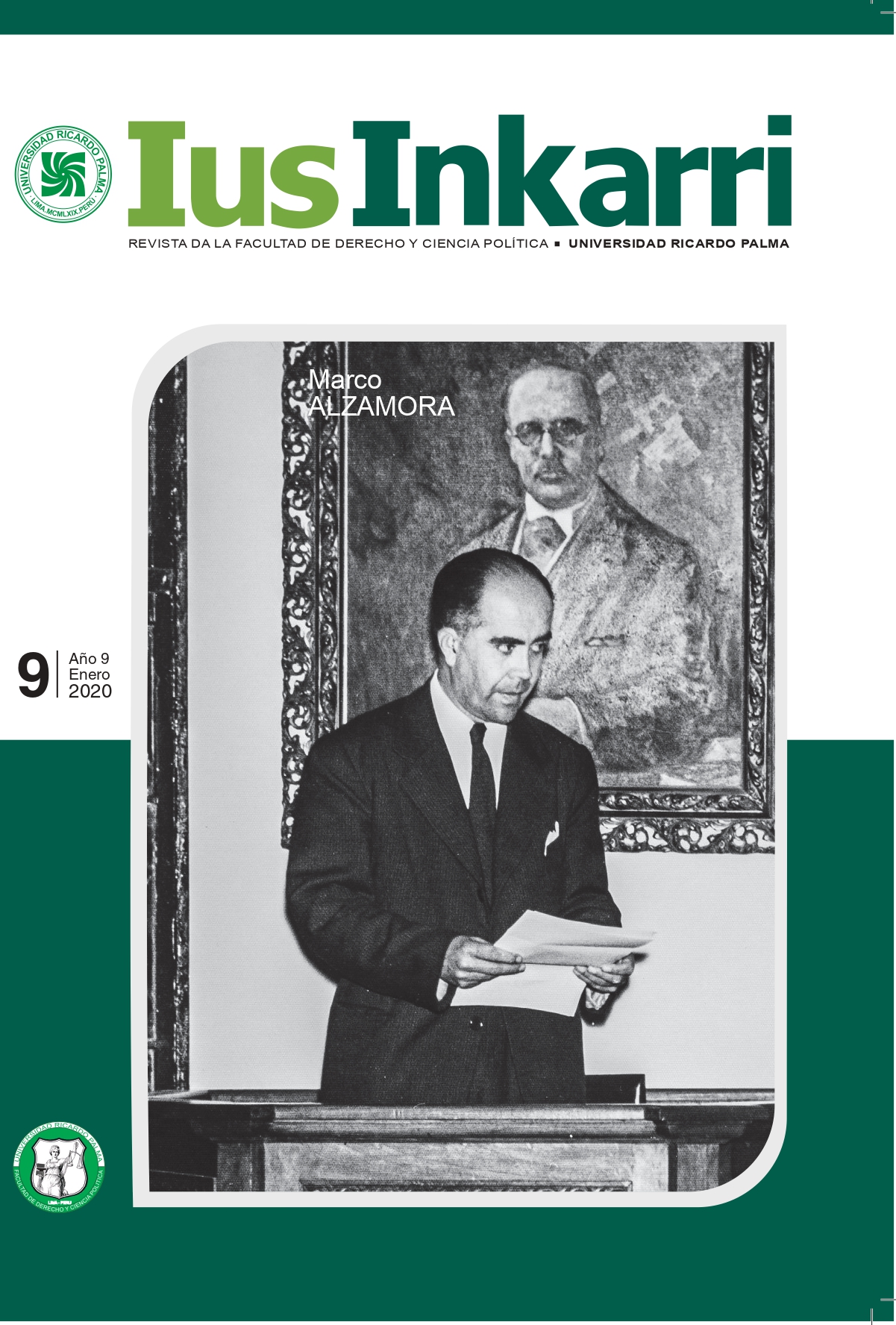Algunas dudas sobre el impacto de la inteligencia artificial en el derecho. Un diagnóstico tentativo para superarlo mediante nuevas opciones y viejas amistades
DOI:
https://doi.org/10.31381/iusinkarri.v9n9.3699Parole chiave:
inteligencia artificial, enseñanza del derecho, automatización, legal management, ingenieros de conocimiento jurídico, análisis de procesos jurídicosAbstract
El presente trabajo aborda algunos impactos que generarán las tecnologías en el derecho en un futuro no tan lejano. Para ello, abordo en primer término, a modo de introducción, y de manera didáctica, uno de los últimos sucesos disruptivos de la inteligencia artificial en los e-sports. Paso seguido, me valgo de esta pequeña introducción para hacer algunas analogías en el derecho. Posteriormente, me centro en la automatización de labores jurídicas y planteo la posibilidad de distinguir entre la automatización total y la de algunas actividades jurídicas, haciendo énfasis en la búsqueda inteligente del material normativo como uno de los avances más significativos. Dicho ello, paso a analizar someramente la situación de la educación legal en Perú y revisar si hay algún interés por la tecnología. Finalmente, argumento sobre algunas alternativas para amortiguar el impacto de la inteligencia artificial y las nuevas tecnologías en la enseñanza del derecho, acudiendo a la revalorización de algunos cursos, pero sobre todo por la apuesta en la ingeniería de conocimiento jurídico, el análisis de procesos jurídicos y el legal management.
Downloads
Riferimenti bibliografici
Agrawal, A., Gans, J. y Goldfarb, A. (2019). Máquinas predictivas. La sencilla economía de la inteligencia artificial. Reverté.
Alchourrón, C. E. y Bulygin, E. (2012). Sistemas normativos. Introducción a la metodología de las ciencias jurídicas y sociales. Astrea.
Ashley, K. D. (2017). Artificial Intelligence and Legal Anaylitics. New tools for law practice in the digital age. Cambridge University Press.
Baer, D. (2013, 18 de abril). Why Data God Jeffrey Hammerbacher Left Facebook to Found Cloudera. Fast Company. https://www.fastcompany.com/3008436/why-data-god-jeffreyhammerbacher-left-facebook-found-cloudera
Berman, H. J. (1996). La formación de la tradición jurídica de occidente. Fondo de Cultura Económica.
Berner, C. et al. (2019). Dota 2 with Large Scale Deep Reinforcement Learning. Cornell University, 1-66. https://arxiv.org/abs/1912.06680
Bix, B. (2008). Lenguaje, teoría y derecho. Universidad Externado de Colombia. Caro, D. C. (2020). Ecosistema de innovación legal en el Perú 4.0. Startups legal tech y firmas new law. Caro & Asociados.
Case Crunch (2018, 19 de enero). Case Crunch Lawyer Challenge: Highlights Video [Video]. YouTube. https://www.youtube.com/watch?v=MMLVKr-_QRU
Cevasco, L., Corvalán, J. G. y Le Fevre, E. M. (2019). Inteligencia artificial y trabajo. Construyendo un nuevo paradigma de empleo. Astrea.
Comanducci, P. (2017). A proposito di. Note sparse sulla teoria del diritto del secondo novecento. Marcial Pons.
Gonzales, G. (2007). La enseñanza del derecho y cultura legal en tiempos de globalización. Derecho PUCP, (60), 51-96.
Granat, R. y Kimbro, S. (2013). The teaching of law practice management and technology in law schools: a new paradigm. Chicago-Kent Law Review, 88(3), 757-782. https://scholarship.kentlaw.iit.edu/cklawreview/vol88/iss3/6
Gruber, T. R. (1993). A translation approach to portable ontology specifications. Knowledge Acquisition, (5), 199-220. https://doi.org/10.1006/knac.1993.1008
Guastini, R. (2014). Interpretar y argumentar. Centro de Estudios Políticos y Constitucionales.
International Bar Association (2017). Artificial Intelligence and Robotics and their impact on the workplace.
Lawrence, J. y Reed, C. (2019). Argument mining: a survey. Computational Linguistics, 4(45), 765-818. https://www.mitpressjournals.org/doi/full/10.1162/COLI_a_00364?mobileUi=0
MacCormick, N. (2005). Rhetoric and Rule of Law: A theory a legal reasoning. Oxford University Press.
Martínez, D. (2019). La decisión judicial automatizada: entre la ciencia y la ficción. En Vial-Dumas, M. y Martinez, D., Pensando al juez (pp. 151-173). Marcial Pons.
OpenAI (2017, 11 de agosto). OpenAI + Dota 2 [Video]. YouTube. https://www.youtube.com/watch?v=l92J1UvHf6M&t=37s
Periñan-Pascual, C. y Arcas-Túnez, F. (2014). La ingeniería del conocimiento en el dominio legal: la construcción de una Ontología Satélite. Revista Signos. Estudios de Lingüística, 47(84), 113-139. https://dx.doi.org/10.4067/S0718-0934 2014000100006
Poggi, F. (2017). La teoría general del derecho como análisis de los conceptos teóricos fundamentales del ordenamiento jurídico. Derecho & Sociedad, (48), 145-161.
Raz, J. (2007). ¿Puede haber una teoría del derecho? En Raz, J., Alexy, R. y Bulygin, E., Una discusión sobre la teoría del derecho (pp. 47-86). Marcial Pons.
Sartor, G. y Branting, L. K. (1998). Introduction: Judicial Applications of Artificial Intelligence. Artificial Intelligence and Law, (6), 105-110. https://doi.org/10.1007/978-94-015-9010-5_1
Skaik, S. y Egelstaff, R. (2019). Legal Project Management for construction lawyers: Intuitive or something else? SoCLA Conference 2018. https://www.researchgate.net/publication/338108281_Legal_Project_Management
_for_construction_lawyers_Intuitive_or_something_else
Solar, J. I. (2018). La codificación predictiva: inteligencia artificial en la averiguación procesal de los hechos relevantes. Anuario Facultad de Derecho. Universidad de Alcalá, (11), 75-105. https://ebuah.uah.es/dspace/handle/10017/36006
Solar, J. I. (2019). La inteligencia artificial jurídica. El impacto de la innovación tecnológica en la práctica del derecho y el mercado de servicios jurídicos. Thomson Reuters Aranzadi.
Wako’s Gaming Review (2019, 3 de septiembre). TI9 CHAMPION OG vs OpenAI Final Version 2019 - Game 1 [Video]. YouTube. https://www.youtube.com/watch?v=t4il-QagP5w
Zagrebelsky, G. y Marcenó, V. (2018). Justicia constitucional. Historia, principios e interpretaciones (vol. 1). Zela.
Zolezzi, L. (2017). La enseñanza del derecho. Fondo Editorial de la Pontificia Universidad Católica del Perú.
##submission.downloads##
Pubblicato
Come citare
Fascicolo
Sezione
Licenza
Copyright (c) 2020 Gabriel Eduardo Uscamayta

TQuesto lavoro è fornito con la licenza Creative Commons Attribuzione 4.0 Internazionale.














